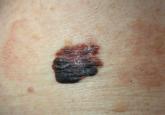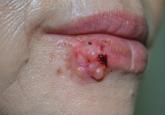Article
Diagnostic and Prognostic Biomarkers and Therapeutic Targets in Melanoma
Diagnostic and Prognostic Biomarkers and Therapeutic Targets in Melanoma is edited by Michael J. Murphy, MD, and reviewed by Anthony M. Rossi, MD...
Dr. Cohen is from the Division of Dermatology, University of California San Diego.
Dr. Cohen reports no conflicts of interest in relation to this post.


Prostate tumorigenesis is related to sex hormones, particularly androgens. It also has been suggested that melanoma may be androgen dependent. Postulated mechanisms of pathogenesis include androgen level imbalance (for which early evidence may present as severe teenaged acne), chromosome telomere length alteration (for which increased risk for melanoma is associated with long telomeres), and host immune response modification.
In a December 2013 article published in the Journal of Clinical Oncology, Li et al (2013;31:4394-4399) confirmed that a personal history of prostate cancer was associated with an increased risk for subsequent melanoma. Among patients with prostate cancer whose median age at diagnosis was 68 years or younger, a higher hazard ratio of melanoma was noted. Also, similar to prostate cancer, they observed a positive association between melanoma risk and severe teenaged acne defined by the use of tetracycline for 4 or more years.
What’s the issue?
Are there clinical implications to the confirmation that there is an increased risk for patients with prostate cancer to subsequently develop melanoma? Specifically, should there be increased surveillance for melanoma in these individuals? Perhaps it would be reasonable to regularly perform a complete skin examination in all patients with a history of prostate cancer, especially men who had prostate cancer diagnosed before 68 years of age.
Diagnostic and Prognostic Biomarkers and Therapeutic Targets in Melanoma is edited by Michael J. Murphy, MD, and reviewed by Anthony M. Rossi, MD...

It is widely accepted that there are several factors that may independently elevate an individual's risk for melanoma, such as a history of...

Dr. Nanette Silverberg discusses melanoma screening in children.

I have taken beta-blockers for nearly 30 years to combat a non–life-threatening but very disconcerting supraventricular arrhythmia. Also being...

Amelanotic malignant melanoma (AMM) is characterized by little or no visible pigment. The diagnosis of AMM is a challenge for clinicians because...
